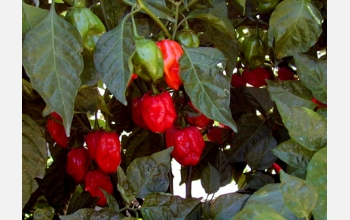Multimedia Gallery
Agriculture Summer Science R&D program (Image 4)
Among peppers from New Mexico, the red savina habanero, a variation of Capsicum chinense, is second in pungency (heat level) only to the orange variety of the same species. Students participating in the ASSURED--the Agriculture Summer Science Research and Development--program research various ways to enhance pepper crops and then prepare presentations about their findings. [Image 4 of 4 related images. See Image 1.]
More about this Image:
ASSURED, which is run by New Mexico State University's Chile Pepper Institute, takes 10 college freshmen and sophomores who are the children and/or grandchildren of migrant and seasonal farmworkers and gives them a chance to work with plants inside in a lab, rather than outside in the fields picking crops.
The program gives students the opportunity to experience firsthand, the satisfaction of enhancing a crop through research. Students learn lab techniques, plant breeding, nutrients, and the ethics and process of research, after which they prepare presentations about their findings. Examples of topics used by students include the control of a pepper-blighting fungus, the effect of an herbicide on crops, agricultural economics and isolation of chile DNA. ASSURED prompts students to consider the possibility of improving productivity through genetic engineering, making plants pest resistant and boosting the nutritional value of a harvest.
Assured is sponsored by the National Science Foundation's (NSF) Research Experiences for Undergraduates program. [This excerpt was taken from NSF Press Release PR 04-082, released June 8, 2004. The complete release is available at http://www.nsf.gov/news/news_summ.jsp?cntn_id=100397.] (Year of image: 2003)
Credit: Photo courtesy Chile Pepper Institute
Images and other media in the National Science Foundation Multimedia Gallery are available for use in print and electronic material by NSF employees, members of the media, university staff, teachers and the general public. All media in the gallery are intended for personal, educational and nonprofit/non-commercial use only.
Images credited to the National Science Foundation, a federal agency, are in the public domain. The images were created by employees of the United States Government as part of their official duties or prepared by contractors as "works for hire" for NSF. You may freely use NSF-credited images and, at your discretion, credit NSF with a "Courtesy: National Science Foundation" notation.
Additional information about general usage can be found in Conditions.
Also Available:
Download the high-resolution TIFF version of the image. (447 KB)
Use your mouse to right-click (Mac users may need to Ctrl-click) the link above and choose the option that will save the file or target to your computer.



